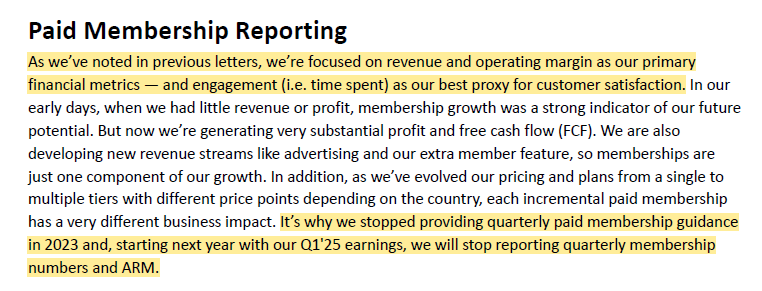
Netflix To Stop Reporting Member Numbers in 1Q25
| 2 min readWhen Netflix recently released its earnings report , it announced that as of 1Q25, it would stop reporting member numbers and average revenue per member. The company had already decided to stop issuing guidance on the numbers last year.

Instead, the company argues that engagement numbers are the more relevant numbers for investors to focus on, basically focusing on hours watched or views. Not surprisingly, this decision also solicited the first question of the earnings call, where the company effectively reiterated its position from its investor letter.
It’s not unusual for companies to have different views on which metrics should matter to investors than the investors themselves. Netflix, prominently early on in its life as a public company, has argued that membership numbers matter more than financial metrics. Also, famously, WeWork introduced a very-much-non-GAAP metric of Community Adjusted EBITDA to shift the discussion from lack of profitability to a metric that was – almost by definition – continuously increasing.
The shift from the old membership metric to the new engagement metric comes at a surprising time. First, the most recent development of the old metric was rather good. As discussed yesterday, Netflix reported membership growth of 16% y/y, a considerable improvement from prior numbers.
Second, the company only recently undertook a very prominent initiative to improve the old metric. In the last 12 months, there were probably more headlines published about Netflix’s crackdown on password-sharing than about anything else involving the company.
Lastly, the company doesn’t tell investors how the new metric has recently evolved. It shares some tidbits, including the most recent successes of Griselda (66.4m views since release), The Gentlemen (61m views since release and an actually funny show), and Damsel (123.9m views). However, those tidbits do not give a sense of the overall number of views, overall engagement, how it evolved over time, or how investors may evaluate the metric as an indicator for future revenue growth.
Overall, the company's arguments and data to shift investor attention from the old membership number-based metric to the new engagement-based metric don’t seem convincing. It’ll be interesting to see whether the company sticks with its decision to discontinue the old metric in 1Q25.

Alex is the co-founder and CEO of Marvin Labs. Prior to that, he spent five years in credit structuring and investments at Credit Suisse. He also spent six years as co-founder and CTO at TNX Logistics, which exited via a trade sale. In addition, Alex spent three years in special-situation investments at SIG-i Capital.